The Red Peony Gambler series of ninkyo-eiga or chivalrous gambler films epitomizes the genre, with one significance difference from the majority: the chivalrous gambler is a woman. As played by Junko Fuji (today Junko Sumiko), she is always cool, collected, & slow to resort to violence. When violence cannot be avoided, she's a spectacular fighter.
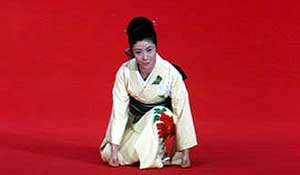 Her character is never demeaned by the marvelous scripts for this series. Some woman yakuza films delight more in a heroine's ability to get naked than to get tough, but Red Peony remains always a character of profound dignity & courage. Her character is never demeaned by the marvelous scripts for this series. Some woman yakuza films delight more in a heroine's ability to get naked than to get tough, but Red Peony remains always a character of profound dignity & courage.
The temptation to add sexploitation to such films was very likely avoidable by Junko by right of her father being a Toei film producer (it's hard to get all pinku with an actress if she's your own blood) & many people with the studio having watched her grow up. The only part of herself that is ever bared is her shoulder, to reveal her tattoo.
Red Peony Gambler (Hibotan Bakuto, Toei, 1968) was the first of what would be a long running film series that would eventually add up to eight films about Ryuko Yano aka The Red Peony. These were hands-down the most successful of all yakuza series, & Junko Fuji far & away the leading female star at Toei & possibly in all Japanese cinema in the late 1960s.
When the craze for chivalrous gambler films was fading, & Japanese cinema going into a general decline, Junko's films remained popular. When she retired by 1973 to begin a family, it was the death-knell for the type of gangster film called ninkyo-eiga. A more chaotic & vicious type of gangster film came thereafter to predominate.
This film has everything expected of a chivalrous gambler film. There's the "greeting" ritual, the sworn-brother ritual, & other somewhat rote scenes given a somewhat feminist bent conveying the formalized nature of the gambler's world. There are gambling sequences & a cheater's pinky-cutting sequence; there are sad-eyed wandering gamblers who seem likely to explode they keep their emotions so bottled up inside; & of course there's a final reel of carnage.
Takeo Watanabe's musical score is a classic for yakuza films. Shin Furuya's cinematography is sensitive to the characters & captures, without lingering tastelessly upon, every element of violence. Junko Fuji personally performs the requisit yakuza-enka or gangster folksong on the soundtrack, in a deep not entirely professional-sounding singing voice, a voice that conveys the power of the character.
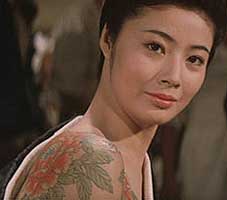 Oryu carries a shortsword or tanto knife in a bag through the backside of her obi (kimono belt), claiming, "It is my flute," until the moment of need, when she proves herself skilled with this deadly weapon. Oryu carries a shortsword or tanto knife in a bag through the backside of her obi (kimono belt), claiming, "It is my flute," until the moment of need, when she proves herself skilled with this deadly weapon.
In an early scene she saves Fujimatsu from being punished by proving it was indeed the gambling den's dealer & not Fujimatsu who had cheated. The dealer is forced to cut off his pinky, an act which looks shockingly real on screen, & is a yakuza film standard method of apology. This will prohibit Masa from ever again working as a dealer.
Soon after, Masa corners Oryu, & has brought several men with him. She unbags her shortsword & cuts Masa along the face & wounds several of his friends into the bargain. Naoji Katagiri (played with angsty sincerity by the great Ken Takakura) intervenes before anyone is actually killed, breaking one man's arm to get the gang to lay off & run away.
Oryu is wounded but at first refuses to let Katagiri dress her injury, for she is embarrassed to reveal her peony tattooed shoulder, symbolc of her status as a fighter & a gambler, & a memorial to her father who was murdered among peonies. She does let him dress the wound there by the canal, & it's a scene simultaneously innocent & romantic.
Oryu drops her wallet which Katagiri is surprised to see. But when she asks if he knows who previously owned the wallet, he denies having seen it before. It was lost by the man who killed Oryu's father five years before. She intends to find out who that man was & avenge her father's death, before re-establishing his business with herself as the labor boss.
After they part, she realizes Katagiri has stolen the wallet, proving to her that he did knowmore than hew was willing to admit.
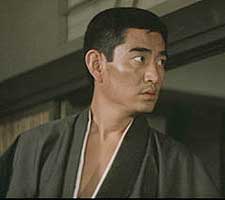 Eventually it's uncovered that the robber who killed Oryu's father was Katagiri's "sworn brother" Kakurai. Katagiri protects his sworn brother & does not let Oryu know who the culprit is, but makes Kakurai promise to be righteous & honest in exchange for this protection. Eventually it's uncovered that the robber who killed Oryu's father was Katagiri's "sworn brother" Kakurai. Katagiri protects his sworn brother & does not let Oryu know who the culprit is, but makes Kakurai promise to be righteous & honest in exchange for this protection.
Kakurai was a samurai before the Meiji restoration. He fell on hard times & became a robber & killer for a while, but has risen in the world & has the chance to be a city councelor in Osaka, thus is in a position to do much good. But his bad streak runs deep & he causes only trouble up to the climactic revenge battle.
Oryu, denied this information, continues her search, aided by Shin & Fujimatsu. Shin has caused trouble for the good Boss Tora, one of Tomisaburo Wakayama's silliest though endearing roles. To keep Tora from having to fight the more powerful boss angered by Shin, Oryu breaks into the bigger gang's headquarters to confront Boss Iwazu. She gives him her gun, bares her tattooed shoulder, & insists he shoot the red peonies instead of fighting with Tora's gang.
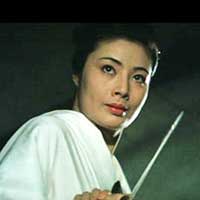 Iwazu is about to have one of his men shoot Oryu when an older woman dressed in masculine costume enters & asks permission to shoot Oryu herself. This woman is Taka, a gambling boss from Osaka, & Iwazu agrees to give up his desire to fight Tora's ang if Taka will shoot the peonies on Oryu's shoulder. Taka takes careful aim & shoots over Oryu's shoulder, hitting the red peonies growing outside in the garden. Iwazu, impressed by Taka's boldness & wit, lets Oryu & Tora off. Iwazu is about to have one of his men shoot Oryu when an older woman dressed in masculine costume enters & asks permission to shoot Oryu herself. This woman is Taka, a gambling boss from Osaka, & Iwazu agrees to give up his desire to fight Tora's ang if Taka will shoot the peonies on Oryu's shoulder. Taka takes careful aim & shoots over Oryu's shoulder, hitting the red peonies growing outside in the garden. Iwazu, impressed by Taka's boldness & wit, lets Oryu & Tora off.
Tora is meanwhile so infatuated with Oryu that he can hardly keep from wetting his pants. Wakayama pulls the character off with an excess of cuteness, but it's clear he's a good, honest, sincere man.
He asks his sister to be be go-between to ask Oryu to marry him. Oryu misunderstands the question when she agrees to the marriage. She thought she was being asked to become Tora's "sworn brother." They have a ceremony to become sworn brothers instead of man & wife, & it is most touching.
Wakayama's character is written out of the script after this, & the story moves to Osaka, but Boss Tora will be a recurring character for the Red Peony Gamber series, so we will most certainly see him again.
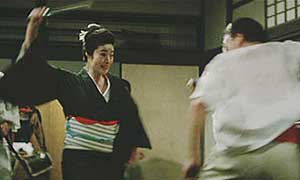 The older woman gambler Taka is being troubled by the evil Kakurai, for he wants to force analliance between the merchants & the yakuza which would benefit mainly himself. Taka refuses, adhering to the yakuza code that gamblers not meddle in the affairs of honest folk. Kakurai therefore kidnaps Taka's impuissant son & threats to kill him. Taka, though tormented, cannot go against the code of gambler conduct. The older woman gambler Taka is being troubled by the evil Kakurai, for he wants to force analliance between the merchants & the yakuza which would benefit mainly himself. Taka refuses, adhering to the yakuza code that gamblers not meddle in the affairs of honest folk. Kakurai therefore kidnaps Taka's impuissant son & threats to kill him. Taka, though tormented, cannot go against the code of gambler conduct.
Event after event proves Kakurai's wickedness until finally his sworn brother cannot protect him an;y longer. Still, Ken Takakura's character cannot attack his sworn brother, & therefore he vows to leave Osaka.
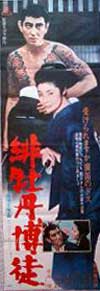 However, Kakurai has hired an assassin, who turns out to be the ex-dicer Oryu scarred, who has spent every moment since his downfall learning swordsmanship in order to kill Oryu. He comes first for Ken Takakura's chivilarous character Katagiri, only to get his arm broken. And now Katagiri knows that being Kakurai's sworn brother means nothing. However, Kakurai has hired an assassin, who turns out to be the ex-dicer Oryu scarred, who has spent every moment since his downfall learning swordsmanship in order to kill Oryu. He comes first for Ken Takakura's chivilarous character Katagiri, only to get his arm broken. And now Katagiri knows that being Kakurai's sworn brother means nothing.
It's time for the inevitable revenge raid. Kakurai's men are ready. Shin is already murdered. Fujimatsu arms himself with longsword & dynamite. Oryu the Red Peony has her handgun & shortsword. Together they break into the gangster's headquarters tossing exposives, swinging swords, & shooting a gun.
Oryu is an impressive fighter throughout, but Kakurai was a samurai before the restoration, & probably her match. As they begin their duel, Oryu's tanto knife vs Kakurai's longsword, when Katagiri shows up to kill his sworn brother himself. To an extent, this is a let-down because it was the Red Peony's duty to avenge her father, not Katagiri.
Katagiri is wounded & near death, but has time to explain his intrusion. He didn't want her to have to kill anybody. Silly boy. But never mind. There'll be seven more feature films about Red Peony, & Junko Fuji will have more powerful climaxes for her character.
Katagiri dies in the Red Peony's arms & it is sad times in the old town tonight. Fujimatsu at least survived, to return to the wife Red Peony had helped him free from bondage to Kakurai. Not many yakuza films have a happy conclusion for anyone.
In the epilog, we learn that Oryu, having achieved revenge for her father, has reestablished her murdered father's business & is now a labor boss. The stage is set for a top-grade set of sequels.
copyright © by Paghat the Ratgirl
|
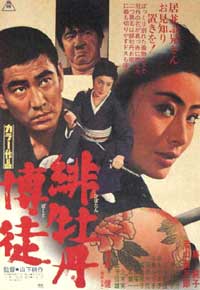
 Her character is never demeaned by the marvelous scripts for this series. Some woman yakuza films delight more in a heroine's ability to get naked than to get tough, but Red Peony remains always a character of profound dignity & courage.
Her character is never demeaned by the marvelous scripts for this series. Some woman yakuza films delight more in a heroine's ability to get naked than to get tough, but Red Peony remains always a character of profound dignity & courage.

 Iwazu is about to have one of his men shoot Oryu when an older woman dressed in masculine costume enters & asks permission to shoot Oryu herself. This woman is Taka, a gambling boss from Osaka, & Iwazu agrees to give up his desire to fight Tora's ang if Taka will shoot the peonies on Oryu's shoulder. Taka takes careful aim & shoots over Oryu's shoulder, hitting the red peonies growing outside in the garden. Iwazu, impressed by Taka's boldness & wit, lets Oryu & Tora off.
Iwazu is about to have one of his men shoot Oryu when an older woman dressed in masculine costume enters & asks permission to shoot Oryu herself. This woman is Taka, a gambling boss from Osaka, & Iwazu agrees to give up his desire to fight Tora's ang if Taka will shoot the peonies on Oryu's shoulder. Taka takes careful aim & shoots over Oryu's shoulder, hitting the red peonies growing outside in the garden. Iwazu, impressed by Taka's boldness & wit, lets Oryu & Tora off.
 However, Kakurai has hired an assassin, who turns out to be the ex-dicer Oryu scarred, who has spent every moment since his downfall learning swordsmanship in order to kill Oryu. He comes first for Ken Takakura's chivilarous character Katagiri, only to get his arm broken. And now Katagiri knows that being Kakurai's sworn brother means nothing.
However, Kakurai has hired an assassin, who turns out to be the ex-dicer Oryu scarred, who has spent every moment since his downfall learning swordsmanship in order to kill Oryu. He comes first for Ken Takakura's chivilarous character Katagiri, only to get his arm broken. And now Katagiri knows that being Kakurai's sworn brother means nothing.